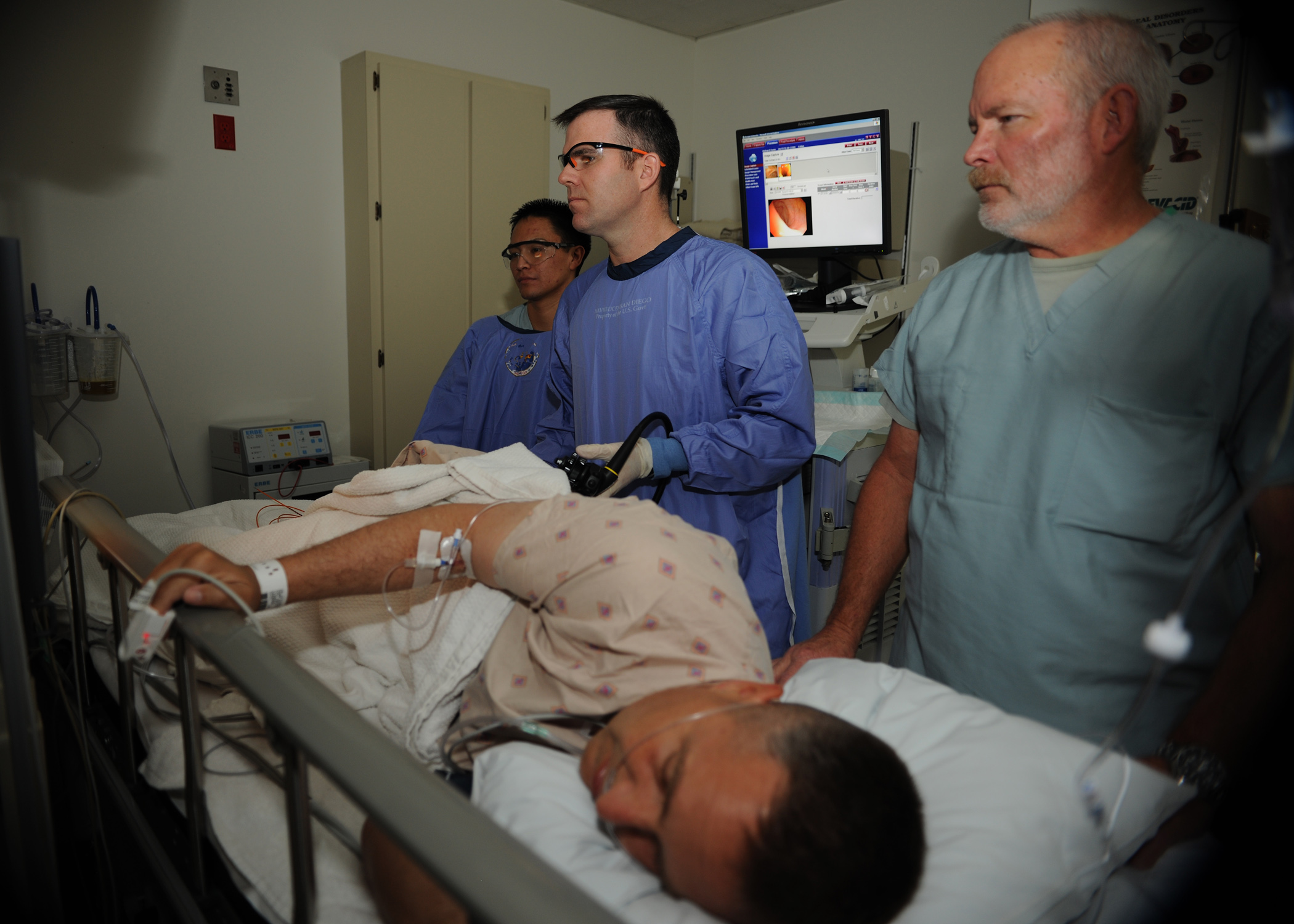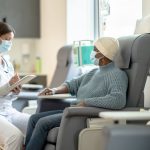
Key facts
- Colonoscopies are used to diagnose medical conditions such as bowel cancer.
- Bowel preparation, using a strong laxative, is necessary to clean out the bowel so it can be examined.
- Sedation is used to keep the patient comfortable during the procedure.
What is a colonoscopy?
A colonoscopy is a procedure that uses a flexible tube, known as a colonoscope. It is inserted into your anus and through the rectum. It lets your doctor see the inside of your large bowel (the colon). The tube transmits images to a screen where signs of medical conditions can be seen.
The colonoscope is a long, thin flexible tube. It has a camera and light so that the bowel can be viewed in detail.
It is flexible and can be moved around curves. This lets it travel the length of your colon.
When is a colonoscopy recommended?
A colonoscopy may be recommended by your gastroenterologist, a doctor who treats gut problems. A colonoscopy may be used to investigate changes in your bowel habits.
People usually have a colonoscopy:
- to identify the cause of gut-related problems such as abdominal pain or bleeding from the anus
- if they have had a positive bowel cancer screening test (poo test)
- if they have a high risk of illness due to chronic bowel disease or a family history of bowel disease such as bowel cancer
- to identify the cause of unexplained weight loss
- following a recommendation from a previous colonoscopy
When should I have a colonoscopy as a screening test?
A colonoscopy is the best way to diagnose and prevent bowel cancer. For most people it is a straightforward test. However, as with most medical tests, complications may occur.
If you are at average or slightly above average risk of bowel cancer, screening every two years is recommended. This is done via a faecal occult blood test (poo test) rather than a colonoscopy.
It is best to talk to your doctor about your risk of developing bowel cancer.
For more information, visit the Choosing Wisely Australia website.
How do I prepare for a colonoscopy?
Bowel preparation is not pleasant, but it is essential for an accurate and safe colonoscopy.
If you need to have a colonoscopy, you will be given detailed instructions on what you need to do.
A complete bowel preparation involves:
- modifying your diet
- increasing your fluid intake
- taking a bowel preparation (a strong laxative)
How will I need to change my diet?
You will be given clear instruction on what you can and cannot eat before the procedure. This may start several days before hand. You will be given specific instructions on the type and amounts of fluids to have leading up to your examination.
It is important to drink only clear fluids on the day before, and to not eat solid foods or dairy products like milk. You will be allowed to have fluids like:
- water
- clear fruit juice (apple, white grape, white cranberry)
- tea or coffee (no milk)
- clear carbonated drinks
- clear soup
You will be asked not to have anything further to eat or drink for a period of time before your procedure — this will be included in the bowel preparation instructions you received.
What is bowel preparation?
Your doctor will recommend the right bowel preparation medicine for you. The bowel preparation will cause diarrhoea so it should be done while at home where you can easily access the toilet.
The area around the anus may become irritated by diarrhoea. Showering, and using moist wipes instead of toilet paper, may help.
Are there any side effects from bowel preparation?
You might have some minor side effects from the bowel preparation, including:
- nausea
- bloating
If you experience any minor side effects take a short break and then start taking the bowel preparation again.
More serious side effects include:
- dizziness
- fever
- severe headache
The more serious side effects might indicate dehydration or an allergic reaction to the bowel preparation.
Contact your doctor if you have any serious side effects or if you cannot finish the bowel preparation.
Should I keep taking my regular medications?
If you take regular medicines, talk to your doctor well before you start taking the bowel preparation. Some medicines should be taken as normal, and some can be delayed. It is particularly important to talk to your doctor if you take blood-thinning medicines, anti-arthritis medication or iron tablets.
What happens during the procedure and straight after?
The colonoscopy lasts for between 25 to 45 minutes. Most people have a mild anaesthetic or sedation to minimise any pain or discomfort. The sedation also means you may remember very little of the procedure or nothing at all.
During the procedure
You will be positioned on your left side and given sedation before the colonoscope is put into your colon. The colonoscope is inserted at the end of your large intestine. It is then withdrawn slowly so the lining of the colon can be examined again. Air is also pumped into the colon to help the doctor examine the lining carefully.
During the procedure, polyps (small tissue growths that might develop into cancer) may be removed. Small tissue samples (biopsies) may be taken and sent to the laboratory to determine what type of disease is present.
After the procedure
Afterwards, you may feel drowsy, and will need to arrange for somebody to help you get home. It is also recommended that you arrange to have someone stay with you the night after your colonoscopy.
Straight after the sedation you should not:
- drive a car
- travel on public transport alone
- operate machinery
- sign legal documents
- drink alcohol
You should expect to make a full recovery the next day.
Your doctor will give you a brief report on what they saw. You probably won’t get your full results and further advice until later at a follow-up appointment.
Your doctor or nurse will also give you instructions on how to look after yourself at home, including:
- when to re-start any regular medicines
- diet instructions
- what to do if you have any problems
Are there any risks or side effects?
Complications during or following a colonoscopy are rare. However, the potential risks of the procedure include:
- bleeding
- infection
- intestinal perforation (when a small tear occurs in the bowel wall)
The combination of bowel preparation and sedation may cause tiredness and weakness following the procedure. This will pass if you rest and drinking plenty of fluids.
A colonoscopy can have minor side effects. These usually pass within a few hours of the procedure. They include:
- abdominal bloating
- gas
- passing a small amount of blood if polyps or tissue samples were taken although this is rare
When should I see my doctor?
If you experience any of the following signs or symptoms up to 14 days after the colonoscopy, you should contact your doctor immediately:
- severe abdominal pain or bloating
- persistent nausea or vomiting
- black, tar-like poo
- persistent bleeding from the anus
- fever or chills
- swelling or redness at the injection site
- any other symptoms that concern you
Other questions you might have
Are there alternatives to a colonoscopy?
There are other less commonly used tests, such as virtual colonoscopy, or flexible sigmoidoscopy.
Virtual colonoscopies use an magnetic resonance imaging (MRI) or computed tomography (CT) scanner. They create images of your colon and rectum on screen. These tests are not as accurate as a colonoscopy because tissue samples cannot be taken. Also smaller abnormalities may not be seen. If the images show any abnormalities, you will need to have a colonoscopy because polyps and biopsies cannot be done during a virtual colonoscopy.
A flexible sigmoidoscopy test is used to investigate the rectum and lower part of the colon only.
What happens if the colonoscopy can’t be completed?
If the colonoscopy is not successfully completed it may need to be repeated.



